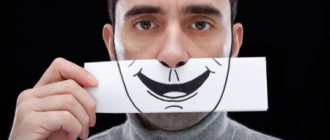Reasons why your head hurts after sleep
Feeling unwell after a night's rest affects not only a person's mood, but also the efficiency of work. Depressive feelings, increased irritability, and unstable emotional state affect relationships with others and the correctness of professional tasks performed. Along with relatively simple, non-pathological causes of pain, which can be corrected by lifestyle changes, the appearance of an uncomfortable symptom can be influenced by serious illnesses that require urgent medical attention.
Manifestations of paroxysm of irresistible drowsiness
Symptoms of the disease first appear in adolescents or young adults, either immediately, or worsen gradually as they grow older:
- Strong desire to sleep during the day, despite a sufficient amount of sleep at night. Such irresistible drowsiness interferes with normal activity, as it is accompanied by lethargy, foggy thinking, apathy, and difficulty concentrating. A person feels “broken,” “squeezed like a lemon,” and constantly tired. He is not in the mood, he is constantly irritated, cannot remember important information, and loses motivation. At any moment and under any circumstances, the patient can fall asleep, and such attacks occur several times a day. It is easy to wake him up and after waking up he, just for a while, feels rested.
- Disturbance of normal sleep at night - frequent awakenings or insomnia.
- Cataplexy – with strong emotions (surprise, laughter, joy, rage, etc.) a sudden loss of muscle tone occurs. A person may fall due to weakness in the legs, arms become numb, and the head “falls.” Such an attack can last a moment or last half an hour.
- When falling asleep or waking up, terrible, very believable hallucinations arise, visual or in the form of sensations and sounds. They scare and even threaten.
- Sleep paralysis - waking up, the patient cannot move or say anything, but thinks quite adequately.
- Automaticity – performing actions “on autopilot”. A person may fall asleep but continue what he was doing while awake without realizing it. This is dangerous, since sleep can occur while driving a vehicle, cooking, etc.
People suffering from narcolepsy also complain of memory loss, double vision, and headaches.
If you have the above symptoms, you should consult a specialist for diagnosis and subsequent treatment. Unfortunately, it is impossible to completely get rid of this neurological disorder, but it is quite possible to correct it and thereby improve the quality of life.
Factors not associated with head diseases
External stimuli that can affect a person’s general well-being are listed in the following list:
- Insufficient rest period, which leaves less than seven hours.
- Oversleeping.
- Drinking alcohol before going on vacation or stimulating energy drinks, including coffee.
- Staying in front of a TV or computer screen for a long time, exposure to blue lighting, flickering, irritating visual receptors, why do you get a headache after sleep?
- Uncomfortable posture leading to prolonged muscle tension.
- Overheating or prolonged exposure to the sun.
- Depressive state.
A person may simply systematically not get enough sleep due to his own or someone else’s snoring or other external noise.
A glass before bed
Thanks to its sedative properties, alcohol can really turn off almost anyone quickly and effectively. At the same time, according to family physician Aaron Clark, it disrupts the natural sleep cycle. In 2015, a study was conducted in Australia in which a group of people regularly drank a cocktail of vodka and orange juice at night. It turned out that during sleep, the “screwdriver” lovers had significantly increased alpha brain activity, which prevented deep restorative sleep. Moreover, according to the American National Sleep Foundation, women are more susceptible to this problem because their bodies metabolize alcohol faster. Of course, once a week will not do any harm. We are talking about systematic and abundant consumption, so limit yourself to a maximum of one glass a day and do it at least a couple of hours before bedtime.
Factors associated with internal pathologies
Pain is not a separate disease, but the first sign of the development of any disorders occurring in the body. If the abnormal condition manifests itself sporadically, and a lot of time passes between attacks, it is not advisable to worry about the presence of a complex disease. If discomfort occurs systematically and is complemented by other pathological signs, it is necessary to find out why the head hurts after sleep and what is the primary source of this condition.
Frequent factors causing discomfort and heaviness in the cranium are:
- spasms of the muscles located in the upper shoulder girdle or neck;
- atherosclerotic disorders, increased internal pressure, stroke;
- head injury as a result of mechanical impact or surgery;
- thrombosis of vascular pathways, resulting in a decrease in the intensity of blood supply and nutrition to brain tissue;
- general intoxication with chemical or biological toxic elements;
- tumor formations in the cranium or cervical region.
Pathologically growing objects in brain tissue are capable of compressing parts of the organ, pinching vascular channels and nerves, which leads to pain.
If you feel exhausted and sleep-deprived in the morning, it may not be the number of hours allotted for night rest. Productivity in the first half of the day can be affected by both morning and evening habits, and sleep may have nothing to do with it.
1. You spend time in bed with your phone.
Instead of getting out of bed immediately after the alarm goes off, you reach for your phone and hang out in bed for about twenty minutes. To be objective, even the phone is not really to blame for anything here. The problem is that you continue to lie in bed. By doing this, you send a signal to your brain that now is the time to continue sleeping, but not to start your day.
And the worst thing is if you actually turn off the alarm and go back to sleep. The worst-case scenario is if you wake up an hour later rather than 10-15 minutes later. This disrupts your sleep cycle, causing you to wake up in the middle of a deeper sleep phase and feel groggy all day.
In short, if you get up, really get out of bed.
2. You're glued to your fitness tracker.
Fitness bracelets are a useful invention. They really help you track your activity levels during the day and your sleep quality at night. Nevertheless, a fitness bracelet will not help you sleep better, but spoiling your mood with a message that today you slept “worse than 95% of users” will do.
Take your time to check your gadget immediately after waking up. Such information can make you stressed early in the morning, and even blame all the problems during the day on poor sleep.
3. You're not drinking enough fluids
Do you feel like a cat has shit in your mouth in the morning? The reason is dehydration. While you sleep, your body cells continue to absorb the liquid you drank during the day. This means that throughout the night you live on daytime reserves, unless, of course, you wake up at night to replenish them.
Water is needed for all processes that occur in our body. Lack of fluid means lethargy and poor health. That is why it is recommended to start the day with a glass of water.
And remember: a cup of coffee may quench your thirst, but it doesn't actually count toward the fluid your body needs. He just needs clean water without any additives.
4. You take a hot shower before bed.
It is generally accepted that a hot bath or shower helps relieve muscle tension and fall asleep faster, right? But this can have the opposite effect. While you sleep, your body's temperature naturally drops, so by warming up before bed, you increase the time it takes to cool down. It's the same as doing CrossFit.
A healthier idea is to postpone your hot shower until the morning and rinse with cool water before going to bed.
5. You exercise in the evening
And again about training. Yes, dragging yourself out of bed early, putting on your gym clothes and going for a morning run or gym session is not so easy, especially in winter. Nevertheless, this is precisely what increases energy, promotes the release of endorphins, and fills cells with oxygen and nutrients.
If you move your sports activities to the evening, most likely, in the morning you will feel as if you were unloading cars all night.
6. You spend little time outside
Daylight invigorates and helps you wake up - all because it reduces the effect of the hormone responsible for sleep - melatonin.
In the sun, the human body produces vitamin D, which maintains energy levels. Numerous studies agree that people who don't get enough sun exposure are more likely to suffer from chronic fatigue syndrome.
Of course, if you live in a northern region where there is little sunlight, taking a vitamin D supplement will help solve the problem.
7. You're listening to the wrong music.
Perhaps you yawn on your way to work because you turned on the radio on the wrong wavelength. Fast, cheerful music improves productivity. According to research, compositions with a rhythm of 120 to 145 beats per minute motivate you to speed up while jogging. You can use this same trick to wake up faster in the morning.
Try changing your morning ritual - you may find that your night's sleep is fine and all you need to do is start your day right.
Source
From the editor
If thoughts about work prevent you from relaxing and falling asleep, try ending your work day with the “BOBO” formula. Four simple steps - and you will feel much better, says psychologist Amantha Imber: .
Many of us lack vitality and strength in everyday life, and this does not always depend on the quality of sleep. American doctor Jacob Teitelbaum offers a unique plan for combating chronic fatigue. You can find out about him from our review of the book “Forever Tired” :.
One way to feel energized and rested after sleep is to use the right essential oil. Svetlana Rudometova tells how to choose and use essential oils correctly .
Diagnosis of head diseases
Symptomatic manifestations are often not specific and may indicate the development of different diseases that need to be differentiated. At the initial stage, the examination is carried out by a therapist or neurologist, who, if necessary, will involve specialists from other areas in the research manipulations: an endocrinologist, a neurosurgeon, a somnologist, an oncologist. If pain occurs, a standard set of diagnostic procedures is prescribed, which includes:
- laboratory analytical screenings;
- electroencephalographic studies;
- radiography;
- ultrasound scanning of the vessels of the neck and head;
- computed tomography screening;
- magnetic resonance examination.
The best way to detect diseases of various etiologies is MRI, as it allows you to visualize tissues of varying densities, pathological areas with microscopic disorders that cause pain. Screening is carried out using a special device that generates a high-frequency magnetic field. When under its influence, dissonance occurs in the nuclei of biological fibers, which is recorded by equipment. The signature is converted into clear black and white images that can not only be zoomed in, but also composited into a 3D model.
Set yourself a regular routine
Go to bed and get up at the same time so that your body gets used to it and takes your routine for granted. Then the question of how to wake up easily will no longer bother you. 2-3 weeks – and easy awakenings are guaranteed. This recommendation can also be given for many other sleep problems, for example, difficulty falling asleep and insomnia. And in all cases, the advice helps tremendously!
How to get rid of pain?
When the original source of heaviness and discomfort in the head is discovered, specific therapy is prescribed, aimed not only at relieving uncomfortable symptoms, but also at getting rid of the source of the anomaly. Directed drug therapy is most often used. If hidden inflammatory processes or internal infection are detected, antibacterial drugs and anti-inflammatory drugs are used.
Vascular and muscle spasms are relieved with antispasmodics. To relieve pain in the head, broad-spectrum analgesics are used. If discomfort occurs sporadically, you can use your usual painkillers. Severe attacks similar to migraines can be relieved only with targeted neurological drugs, which can only be prescribed by the treating specialist.
Treatment for heel pain
The treatment plan for pain localized in the back of the foot depends on the nature of the process that caused the negative sensations. With a medicinal approach, patients are prescribed different types of treatment aimed at relieving pain and restoring functional activity:
| Types of treatment | Description |
| Anti-inflammatory therapy | The medication plan includes non-steroidal and hormonal anti-inflammatory drugs (NSAIDs, NSAIDs, glucocorticosteroids), a course of massage and exercise therapy. |
| Normalization of blood flow | For vascular disorders, drugs are prescribed to restore microcirculation and increase capillary resistance (angioprotectors, anticoagulants, ganglion blockers). |
| Restoration of nerve conduction | Symptomatic treatment is used (antidepressants, anticonvulsants). |
B vitamins are used as supportive drugs, and immunomodulatory agents are used for the treatment of autoimmune diseases.
It is possible to treat pain that prevents you from walking on your leg using surgical methods. Surgery is performed for complicated pathologies caused by traumatic or degenerative changes in the tissues of the heel. Surgical treatment is performed for fractures, ruptures of the Achilles tendon, plantar fasciitis and to remove arthrosis osteophytes.
Where is the head examination performed?
Directed diagnostics are carried out in specialized institutions that have tomography facilities. You can find a multifunctional research center on the website of the unified recording service, the telephone number of which is indicated at the top of the page. The portal contains data from all tomography clinics located in each district of the city. Study the information, mark the best offers, make an appointment and receive a special discount from the service in the amount of 1000 rubles for the selected type of screening.
Treatments for Morning Fatigue
Treatments for morning fatigue depend on the underlying cause.
Good sleep hygiene includes:
- limiting daytime sleep to 20-30 minutes
- Natural exposure to sunlight every day to regulate the body's internal clock
- a regular sleep routine, which may include taking a warm bath, drinking herbal tea, or reading
- creating a comfortable sleeping environment that is dark, cool and quiet
- comfortable mattress and pillow
- avoiding using the phone and computer for 2 hours before bedtime
- It is important to stick to the same sleep and wake times every day.
Exercise and dietary habits can have a significant impact on your sleep quality. To prevent morning fatigue, you need to:
- Limit caffeine intake
- Avoid drinking alcohol in the evening
- Avoid drinking liquids before bed
- Avoid foods and drinks that may cause heartburn and other digestive problems.
“The way you go to bed, the way you sleep”
Rembrandt.
"Sleeping Man" Fragment. 1629 Not everyone knows that the shelf life of a mattress is 9–10 years, and then only if it was originally of good quality. There is even a small study on this subject by scientists from the University of Oklahoma (USA).
59 men and women experienced better sleep quality and less morning muscle and joint pain after they were offered new mattresses to replace their old ones.
The mattress should be of medium firmness, and it is also very important that it is made from materials that do not cause you allergies.
It is also worth purchasing comfortable pillows made of hypoallergenic material and not forgetting about hygiene. According to some sleep specialists, clean sheets significantly improve the quality of sleep.
Increasing physical activity
A sedentary lifestyle has a very bad effect on the quality of sleep, but when planning to increase physical activity, you need to keep in mind some of the characteristics of our body.
If you spend an hour or two in the evening doing fitness in the gym, you may not fall asleep after that. Intense exercise will not only raise your body temperature, but it will also affect the activity levels of a number of hormones, and this can delay falling asleep and affect the quality of your sleep.
If you go to the gym in the evening, schedule your workouts so that they end 3-4 hours before bedtime.
If you're not into sports or fitness, start small. Even just 20 minutes of exercise upon returning from work can improve the situation.
And, of course, nothing beats an evening walk, because it’s movement, fresh air, and an opportunity to escape from various worries.
Silencing the sounds
51 aspects of daily life, sleep.
Miniature from the medieval medical treatise Theatrum sanitatis Some people are convinced that turning on the TV helps them fall asleep and does not affect the quality of their sleep. It's a delusion. Background noise significantly reduces deep sleep and also promotes frequent awakenings.
If you cannot block out some sounds from household appliances, use earplugs. “White noise” (for example, the sound of rain or a waterfall), samples of which are available in large quantities on the Internet, can also improve the quality of sleep in such a situation.
Adjusting the light
Much has been written about how blue light waves reduce the production of melatonin, and therefore sleep specialists advise not to sit in front of screens or use gadgets for at least an hour before going to bed.
In case you do find yourself sitting in front of a computer late into the night, it is useful to keep in mind that there are special glasses that block blue light, as well as computer applications with a similar function.
Not everyone knows that to get a good night's sleep, we need bright light during the day, which also affects circadian rhythms and, ultimately, how rested you feel in the morning.
Walking during the day, even in cloudy weather, will help you rest better at night.
In addition - and this is especially important in the cold and dark seasons - the lighting in the workroom should be bright enough. It will keep you alert and focused throughout the day and help your body keep its biological clock in good working order.









